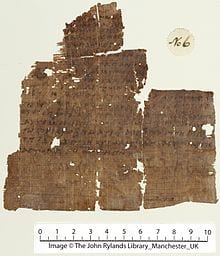
I’ve been reciting two Christian Creeds (one of them by heart) since I was little. Their recitation puts me right where I belong, in the midst of a community united by common beliefs. But how do I understand those beliefs. In this post I’m puzzling about the fifth word in the original Greek version of the Nicene and Apostles’ Creed, pantokrator. English translates this word “almighty” — God is infinitely powerful.
This is the second in a series on the Creed of Christians. An introduction consists of my retelling of the Creed’s story. That and links to other posts in the series are here.
In my just-completed series of posts on miracles, God’s power had to be an important theme. That series ended with the thought that miracles may be less a show of God’s power than a more obvious than usual example of God’s rule in the world. I took rule in the novel sense Jesus gave it – not exercising power over others but serving with others. God acts in the context of the natural world that science studies. Miracles, I suggested, are among the ways God cooperates with rather than overrules the ordinary processes of nature.
How can an almighty God allow suffering?
The atheist argues that there must not be an all-powerful god, who is also all-good. Such a being would be able to – and should – eliminate suffering from the world or create a world without suffering in the first place. Suffering, even terrible, undeserved suffering, exists; so that god must not exist.
It’s an old problem. I take some comfort from the fact that the atheists aren’t coming up with anything the tradition hasn’t dealt with. Still I want to hazard a solution. My attempt will have a couple less than traditional twists. First, I’m suspicions of power in general and doubtful about using it in one’s imagining of God. Second, Jesus, even as he worked miracles, doesn’t strike me as wielding power as we imagine it.
Greek pantokrator is English “almighty,” but …
The word “almighty” in the English Creed suggests a lot of power. I went to the original Greek and found pantokrator. It’s a hard word to put into good English. Panto is all, and krator is related to words like democrat and aristocrat (rule by the people and rule by the best). So the word literally says ruler of all. I’ve come up with words like “omni-potentate” and “plenipotentiary”; but they’re not much good in a prayer. “Almighty” might be the best we can do.
“Almighty” has a couple problems, though. First, it’s an adjective and the Greek word is a noun. That’s not so bad, but our English translation says
I believe in God, the father almighty….
“Father almighty!” Who ever heard of a father, in this day and age, who is almighty? The two images just don’t fit together. In ancient Rome I suppose it was different. Father’s had unlimited rights over their children, including the right to discard an unwanted child. Jesus didn’t think of fathers that way. Neither did early Christians, who were notorious for rescuing exposed babies and raising them as their own. When Jesus called God Father, it wasn’t power that he was thinking of.
In Greek the word pantokrator addresses God directly. It doesn’t say God is a father who is almighty. If I could I would make a slight modification to our English translation. I would have it say,
I believe in God, the Father, the Almighty One, the Creator….
That would make three nouns, just like in Greek, three separate statements about God. I wouldn’t have to try to imagine fatherhood and almighty-ness in one blow. My experience as a father has taught me, don’t even try to do that.
What does pantokrator say about power?
The short answer to what we learn about God’s power from the word pantokrator is … Nothing. Pantokrator isn’t about what God can do. There’s no potency in it. It’s all about what God actually does do. God rules everything. If there’s something else that God could do, pantokrator doesn’t say it.
“Almighty,” on the other hand says that God can do anything, including things that God has never done and never will do. It seems to say that God could have created a world without suffering and that God could even now eliminate suffering from the world. “Pantokrator” is different enough that I wonder how much we should say about God’s power.
God cannot stop loving.
Traditionally Catholic theology has acknowledged some limits on God’s power. God cannot break the logical law of non-contradiction. Unmarried bachelors are beyond God’s power to make. That’s rather trivial. “Unmarried bachelor,” even as a concept, does not exist. It’s just words.
A more significant limitation, which the Catholic Church allows (although I understand some Christians don’t) comes from the moral law. God cannot do evil. A particular, biblically relevant example: God cannot make the end justify the means. God cannot wipe out a whole ethnic group just to keep his own favored ethnic group religiously pure. A lot of people think that’s exactly what God did, as recorded in the Book of Joshua. But that book is a human creation. Catholics know that book also is the word of God but are not required to believe in its historical accuracy.
I’m imagining another limitation besides these two traditional ones. God created a world out of love and can’t stop loving that world. God loves enough to take the risk of designing a world such that creatures could understand it. Modern science tells us something about that understanding and that love.
To understand is not just to know what the world is and how the world works. Understanding in modern science means knowing how the world came to be the way it is. That’s why we send rockets to the farthest parts of the solar system. We’re looking for clues to the origin of the planets. We dig for fossils to understand how dinosaurs evolved. Then we classify them according to their place on the evolutionary tree, not just by how they look. We want to know even how the elements evolved in star furnaces. With knowledge like that we can change nature and predict the consequences of those changes. With wisdom or without it, we create the future. Therein lies the risk God takes out of love.
To love is to trust.
You could say it turned out badly. We’ve used our knowledge to create new substances and ignored the poisoning of our surroundings. We’ve devised new ways of living together—new political arrangements, new economies—not out of love but out of greed and lust for more of the power God gave us. We turn a blind eye to obvious consequences, spiritual and material poverty, the degradation of the whole planet.
Much suffering results from the use we have made of this world that lends itself to our understanding. Should God intervene in ways that defy our understanding? Should God change the way the world works to make everything come out right? That would be to take away God’s most loving gift, a world we can understand and the chance to be co-creators with God. With that love God said from the beginning, “I believe in you.” God became a believer and cannot stop being what God became. God will trust to the end even though it means allowing a world of suffering. (How God joined that suffering to God’s own self is the amazing beauty of the story of Jesus.)
What else could God have done?
I don’t think I’ve answered the atheist’s challenge entirely. A person still might imagine God creating a world in which suffering is absent. One could populate that imaginary world would with sentient creatures and no experience of pain. One could still say that’s what God should have done, if God exists. But I would challenge the atheist with these questions:
If you lived in that world, would you understand it? Would it make the kind of sense that you could depend on, that allowed you to create your future? Would there be a science of that world’s evolution?
I’ve tried to find a Yes answer to those questions. I’ve tried to imagine being Darwin in that world and coming up with a theory of evolution that didn’t involve scarcity, competition, death, and survival of the fittest. So far, I haven’t been able to do it. I’m not sure God could either.
Image credit: Vicki Hurley via Google Images












